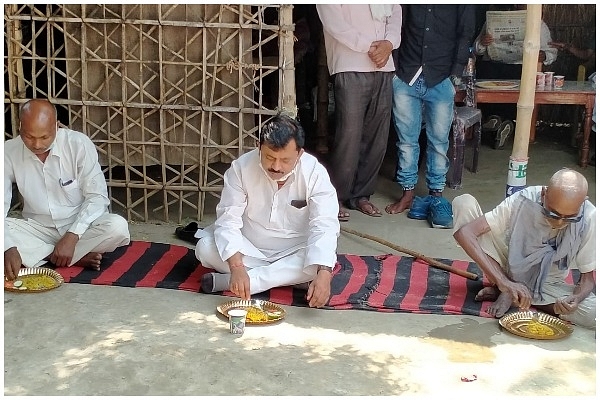
‘Resentment Among Dalits Could Turn Into Another Epidemic,’ Says UP MP Who Ate Dalit-Cooked Food To ‘Send A Message’ After A Villager Refused It
Pradhan, Lilawati Devi, had taken it upon herself to prepare meals for five quarantined men in the village for one day, as the cook in-charge was on leave.
While men of other castes ate the food without a peep, the villager in question, Siraj Ahmad, said his community would ‘outcaste’ him if he ate food cooked by a Dalit.
Last week, a man was booked under the Scheduled Castes Atrocity Act for refusing food cooked by a dalit woman at a government quarantine facility in Uttar Pradesh. The man, Siraj Ahmad, belongs to Bhujouli Khurd village of Kushinagar district, which is near Gorakhpur.
As per the dalit woman, who is the pradhan of the village, Ahmad kept on saying that his community would ‘outcaste’ him if he ate the food cooked by her.
The pradhan, Lilawati Devi, had taken it upon herself to prepare meals for five men at the facility for one day, as the cook in-charge was on leave.
Ahmad, who is about 22, along with four other men, had returned to the village from Delhi on 29 March.
In accordance with the government advisory, the group was lodged in a primary school for a period of isolation. They had been eating the food prepared at the centre.
On 10 April, when Lilawati Devi prepared the food, Ahmad refused to eat.
“Siraj did not touch the food at all. He kept on saying that he would not eat it. That his community would ‘outcaste’ him if he ate the food prepared by a chamaar,” Lilawati’s husband Subhash Gautam told Swarajya on the phone (he said his wife was not available to talk).
Gautam said the group comprised of two Muslims, two men from Chamaar caste and one man from Nai caste (counted among backward castes).
“The Hindu men ate without complaining. The other Muslim man had started eating but, seeing Ahmad, he too began to show apprehension. Ahmad, however, was adamant that he would not touch the food and kept on loudly saying so.”
“We were heartbroken. Tears welled up in our eyes,” says Gautam. “We were born in this village and grew up here, but never before did we face such humiliation.”
Gautam says he does not recall any case where “upper-caste” Hindus refused food at a wedding hosted by “Dalit samaj”.
The Chamaars are the largest caste group in the village at around 35 per cent, with Muslims the second largest at around 12-13 per cent. Among the rest are Brahmins, Nais, Lohars and Dhobis, says Gautam.
The pradhan informed the local district authorities — Sub-Divisional Magistrate Deshdeepak Singh and Block Development Officer Ramakant — about the incident. A police case was then registered at Khadda police station under the Scheduled Caste and Scheduled Tribe (Prevention of Atrocities) Act.
Two days later, the member of parliament (MP) from Kushinagar, Vijay Dubey, ate a meal prepared by the dalit pradhan in public view in order to “send a message in the area against such discrimination”.
Dubey said, “I read about the matter in a newspaper. I immediately called up Lilawati ji and requested her to prepare Tahiri (a rice dish) for five men. I, with four-five men, then went to Bhujouli Khurd.”
Dubey, a Brahmin by caste, says that he felt that if he did not nip the ill-feeling in the bud, it could well turn it into “another epidemic”.
“Maine socha dalit samaj ke logon mein is ghatna ka kya prabhav padega. Ye to doosri mahamaari ka roop le lega (I wondered what effect this incident would have on the minds of young dalits. The resentment could well turn into another epidemic),” he says.
Dubey, who represents the Bharatiya Janata Party (BJP), says he first learnt about the pressing need for eradicating caste-based discrimination when he joined Yogi Adityanath’s outfit Hindu Yuva Vahini 20 years ago.
“Maharaj ji has been preaching against casteism for long. No one is less than the other, this is precisely what we learnt from him,” he says.
Dubey says that he is confident that his gesture sent across the right message. “I also told people not to be hypocrites. If they can eat from dhabas at thelas in Delhi without asking for the cook’s caste, why can’t they do the same in their own village? You see the hypocrisy?” says Dubey.
Dubey, however, says that what he did was not the first-of-its-kind initiative in the area. “There has been a parampara of sahbhoj (eating together) in the district for quite long. We organise such events every now and then where all castes get together and eat together,” he says.
Lilawati’s husband Gautam told Swarajya that the family welcomed Dubey’s gesture. “He is a big man. If he shows the way, the others follow,” he says.
Gautam, however, said he and his wife are still hurt. “Mann dukhi hai (it hurts),” he says.
“What happened at the primary school is the first such incident I have seen.”
Gautam, however, says that after the FIR, the family of Ahmad came to his house and apologised.
“His mother fell at my feet. I had to request her not to. I have no ill-will against them now that they have apologised,” he says.